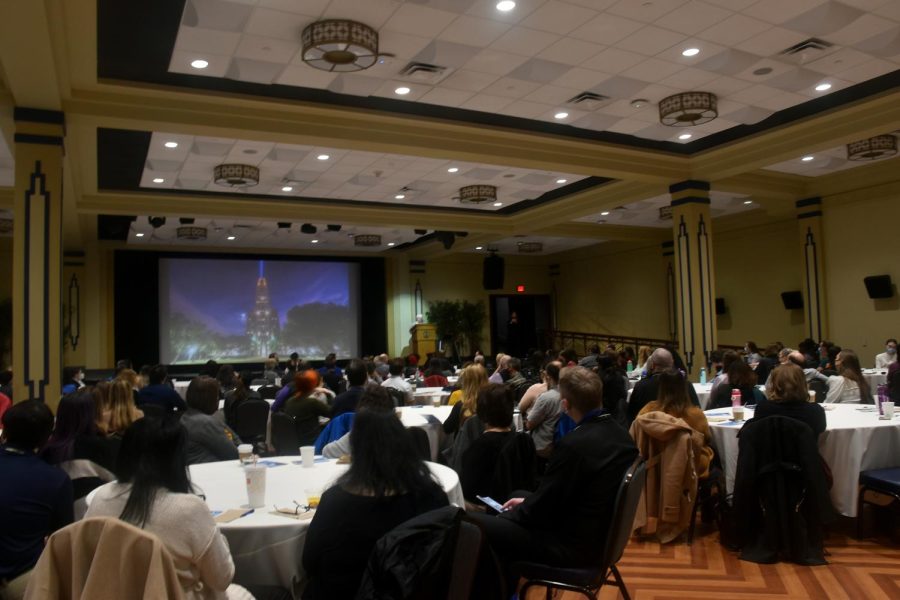MLK Social Justice Symposium highlights the meaning of privilege
Amaya Lobato | Staff Photographer
Attendees at Wednesday’s MLK Social Justice Symposium at the University Club.
February 25, 2022
Dean of Students Carla Panzella said it’s important to acknowledge one’s privilege and marginalized identities in order to better understand social issues and inequity.
“Start by understanding and naming your own privilege,” Panzella said. “Start by understanding how you may have experienced or are still experiencing being marginalized and start by embracing how you are responsible in individual and daily ways for making [Pitt] a more equitable and just community.”
With her call to action, Panzella set the tone for Pitt’s annual Dr. Martin Luther King Jr. Social Justice Symposium, which took place on Wednesday in the William Pitt Union. The Office of Cross Cultural and Leadership Development hosted the event, and Sherdina Harper, the chairperson of the Diversity, Equity, and Inclusion Committee at the Office of Student Affairs, planned it.
Titled “Walking the Tightrope: Balancing the Intersection of Marginalized and Privileged Identities,” the symposium addressed social issues and current world events, as well as topics such as microaggressions, allyship, code-switching, passing and intersectionality. Limited to Student Affairs staff due to COVID-19 restrictions, around 200 people attended the event
Along with Panzella, who introduced the event, the lecture hour of the symposium included five other keynote speakers. Harper said all featured speakers were members of the Pitt community.
“[These are] people that we sit next to in our meetings — our colleagues sharing some of the experiences that they’ve had,” said Harper.
Kyoungah Lee, the assistant director of International Programs, talked about her experience as a South Korean woman in the United States, as well as how the idea of linguistic perception has impacted her life.
Recounting her time as a student at the State University of New York at Buffalo, Lee said she believed for a long time that she couldn’t assume the same leadership positions as her native English speaking counterparts.
“I wanted to be a student leader,” Lee said. “[However], I had no confidence at that time, because the way I saw the student leader was very well-spoken … because of my culture and language barrier, I was not confident at the time and nobody told me I was competent to do so.”
Kenyon Bonner, vice provost of Student Affairs, said he faces different experiences depending on the way he presents himself and shared his experience as a Black man living in Pittsburgh.
“When I wear a suit, I feel acknowledged. When I don’t wear a suit, I feel like people look right through me … I [go on runs] in Brooks running shoes, a t-shirt, and sometimes a hoodie,” Bonner said. “I’ve lost count of the occasions in which I’m running in my neighborhood, a white neighborhood, and a police car slowly pulls up the street and circles back.”
The speakers at the symposium also addressed the impact of microaggressions. Rich Fann, the associate director of the Office of CCLD, said he faced many microaggressions within the New York City education system as a child and described similar experiences he still faces today.
“Every teacher meant well, but they would say, ‘You speak so well! You do this so well! I don’t understand your credit to your race,’” Fann said. “‘You’re one of the good ones.’ I didn’t know how to process that.”
Through these deeply personal presentations and staff education initiatives, Harper said she hopes that Pitt community members will apply the messages taught at the symposium and take action toward making both Pitt and other spaces more inclusive and equitable.
“The question I want everyone to walk away with is ‘What is our privilege, and what are we doing with that privilege?’” Harper said. “Whether it’s educational privilege, whether its heterosexual privilege, whether it’s gender privilege … it’s all privilege. What are we doing with the privilege to help those people that are in marginalized communities?”








